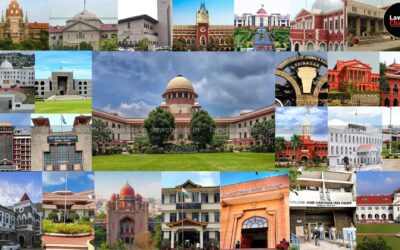Disrespecting Mahatma Gandhi statue: Ker HC quashes case against law student

Kerala High Court: In a petition filed by a law student (‘petitioner’), accused under Sections 153 and 426 of the Penal Code, 1860 (‘IPC’), of denigrating the image of Mahatma Gandhi, a Single Judge Bench of V.G. ArunJ., quashed the case and held that while the objectionable conduct of the petitioner was undoubtedly immoral, it could not be termed illegal in the absence of a law preventing and prescribing punishment for such an act.
Background:
On 21-12-2023, around 04:30 p.m., while preparing for the Christmas celebrations at the Bharata Mata School of Legal Studies, of which the petitioner was a student, he placed a pair of cooling glasses, and a Christmas wreath around the neck of the statue of Mahatma Gandhi installed inside the campus. It was alleged that the petitioner also commented that Gandhi was long dead. His act was videographed and posted in the students’ WhatsApp group which led to discontent and complaints being submitted to the Principal. The case was registered, and he was also suspended from the college for five days and made to pay a fine of Rs 5000 to the Kerala State Legal Services Authority.
The petitioner’s counsel admitted that the petitioner’s conduct was unjustifiable but contended that it could not result in criminal prosecution under Section 153 IPC since the conduct must not only be malignant but also illegal. It was stated that no law enacted by the Centre or the State prescribed punishment for defiling the statue of Mahatma Gandhi, although a private bill with such an objective was moved, but it did not get the Parliament’s assent. The counsel further submitted that petitioner’s act had neither resulted in wrongful loss or damage to the public or to any person, nor had it caused destruction or damage to any property, or diminution in the value or utility of the property and therefore the offence of mischief was not attracted.
Relying on B.N. John v. State of U.P., 2025 SCC OnLine SC 7it was also contended that Section 426 IPC being a non-cognizable offence, once prosecution for the offence under Section 153 IPC was held unsustainable, registration of the crime itself would be rendered invalid in view of the interdiction contained in Section 155 of the Criminal Procedure Code, 1973 (‘CrPC’). Finally, the petitioner’s counsel pleaded that a lenient view be taken in the matter considering the petitioner’s young age and the fact that the act was not premeditated but committed on a rush of blood and realising his folly, he had removed the glasses and the garland immediately.
The Public Prosecutor submitted that whether the act committed by the petitioner was wanton or malignant and was done with the intention to cause damage was to be decided based on the evidence to be tendered before the Trial Court and it would be inappropriate for this Court to intervene. The counsel for Respondent 3 also alleged that the petitioner’s act had resulted in a riotous situation due to the discontent and agitation among student and therefore, the offence under Section 153 IPC was attracted and no leniency should be shown in this matter.
Analysis and Decision:
The Court pointed out that although not specifically mentioned in Article 51A of the Constitutionit was the duty of every citizen to respect the freedom fighters who were instrumental in liberating our country from foreign rule. The Court observed that the petitioner’s conduct was deplorable, and he should have known that the rights and freedom guaranteed by the Constitution ought to be tempered and moulded by the fundamental duties cast upon him.
The Court observed that all immoral acts were not illegal acts and explained that illegal acts were behaviours or actions explicitly prohibited by law, enforceable by the State, and subject to legal penalties like fines or imprisonment, while immoral acts were behaviours considered wrong or unethical according to societal norms, personal values, or moral frameworks, which might not necessarily violated laws. The Court noted that not even the Prevention of Insults to National Honour Act, 1971contained any provision against defilement of the images or statues of our national leaders and highlighted the principle of no charge without law meaning, no crime without law, which was fundamental to criminal law. Consequently, the Court held that the objectionable conduct of the petitioner was immoral but not illegal.
Regarding the accusation of mischief, the Court opined that the act could be termed mischief in common parlance but even if the act committed by the petitioner hurt the sentiments of others, it could not be termed as mischief under IPC as the act did not result in any of the situations enumerated in Section 425.
Therefore, allowing the petition, the Court quashed the final report and all the further proceedings in the case.
[X v. State of Kerala, Crl.MC No. 10891 of 2024, decided on 30-07-2025]
Advocates who appeared in this case:
For the Petitioner: S. Rajeev, V. vinay, MS aneer, Dipa v., Sarath KP, Anilkumar CR, Ks Kiran Krishnan, Advocates.
For the Respondents: Hashim KM, Jithin Alexander Sunny, Mohammed Ashraf, Aasif Muhammed PM, Advocates.

